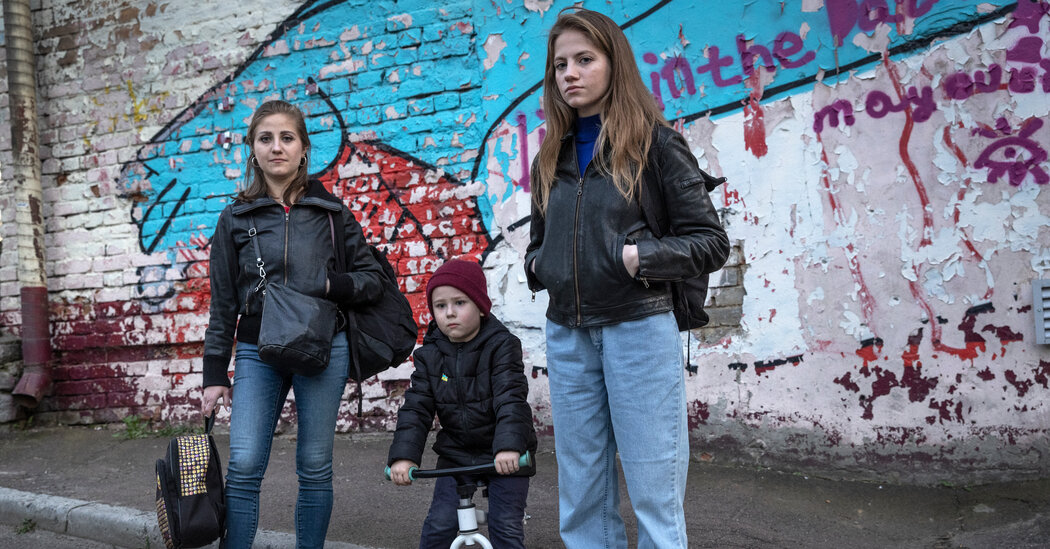
Vera and Nicole thought they had endured the worst of the war as Russia besieged their city, Mariupol, for weeks. The sisters helped neighbors bury neighbors, melted snow for drinking water and survived a bombardment that tore a hole in the ceiling of their home.
But by mid-March, they knew it was time to leave. They heard that the Russian invaders were sweeping the southern port city and transferring Ukrainians by bus either to Russia or to Russian-controlled territory.
The sisters took Vera’s 4-year-old son, Kirill, slipped out of Mariupol on foot and embarked on a harrowing journey. They said they crossed a heavily mined road strewn with corpses; encountered a Russian sniper near a church who waved them on; and survived an artillery barrage in a field of flowers. After two days, the trio staggered onto a highway, only to be met by a Russian soldier who directed them to a packed bus.
“He told us he had liberated us and asked why our faces had gone dark,” said Nicole. “The way forward was maybe a prison — but it was our only option.”
The bus took them to a school in the nearby town of Nikolske, which they said had been converted into a Russian-operated registration center where Ukrainians were filling out forms with their personal information. That was their first brush with what Ukrainian and U.S. officials and human rights groups have called “filtration” centers that they say are part of a system of forced expulsions of Ukrainians to Russia.
Forced population transfers and so-called “filtration” are tactics that were used by Russia during the Chechen wars in the 1990s, according to Frederick W. Kagan, a senior fellow and director of the Critical Threats Project at the American Enterprise Institute. He said the strategy was to terrify the population into submission, keep control over witnesses to atrocities and separate out anyone seen as resistant to a Russian takeover.
The story of Vera and Nicole, who asked that their last names not be used for fear of Russian reprisals, first came to light when they contacted a British humanitarian organization, United with Ukraine, which has been working to get aid to Mariupol since March. The group arranged contact with The New York Times.
The sisters, who say they are telling their story to show the world what is happening in Russian-controlled territory, have also spoken to other news media outlets. They shared videos and a diary with The Times chronicling their life in Mariupol and part of their escape from the city, which has now fallen almost entirely under Russian control.
Rachel Denber, the Human Rights Watch deputy director for Europe and Central Asia, said the group had documented two witness accounts of being taken to filtration centers and said Russia’s actions “bore all the hallmarks of a forced transfer.” She added that the Fourth Geneva Convention, to which Russia is a signatory, prohibits the forcible transfer of civilians from occupied territories, which would make such forced transfers a war crime.
“We can’t discount the fact that there might be people who made an informed choice to go to Russia,” Ms. Denber said. But, she said, other Ukrainians “are leaving because they have no other choice than to either go to the occupying power or die.”
The roads out of Russian-held territory are also notoriously dangerous in places.
Ukraine’s ambassador to the United Nations, Sergiy Kyslytsya, told the Security Council recently that there were filtration centers in three Russian-controlled towns — Nikolske, Manhush and Yalta. All three, like Mariupol, are part of the Donetsk region, which borders Russia.
Vera and Nicole said they stayed briefly in filtration centers in two of those three towns during their escape from Mariupol.
The two centers that Vera and Nicole passed through in Nikolske and Manhush were not heavily guarded and some there were given the option to stay or go, they said. But they said it wasn’t much of a choice: The Russians were offering safe passage in one direction only, and it wasn’t to Ukrainian-held territory.
“For some, their houses were destroyed and there was nowhere to go,” said Vera. “Others were there to save their children. This was the only safe option left to them.”
Tatyana Moskalkova, Russia’s commissioner for human rights, has denied that Ukrainians were being forcibly transferred to Russia. President Vladimir V. Putin says that about a million Ukrainians have been taken to Russia, but he describes the movement as evacuations.
The Russian authorities have described the invasion of Ukraine as a necessary mission to assist their ethnic kin who they say faced discrimination. They have portrayed efforts to bring people displaced from the east of Ukraine to Russia as a humanitarian operation to save them from the Ukrainian authorities.
Vera and Nicole’s ordeal began around the middle of March, when Russian soldiers were tightening their grip on Mariupol. Nicole said she had heard a radio report saying the International Committee of the Red Cross had begun evacuating people from the outskirts of the city.
“We were terrified,” said Nicole, 21. “But each day we waited, we knew it was getting more difficult to leave.”
Russia-Ukraine War: Key Developments
They decided to risk it, even if it meant leaving members of their family behind.
They said goodbye to their brother, who feared that if he left with them, he might be stopped by Russian soldiers who had reportedly been strip-searching men of military age, checking evidence of service or training, such as tattoos or calluses on their trigger fingers. Their mother, who had been separated from them since the start of the invasion, would not even know they had left.
In a series of video calls over the past few weeks, the sisters described an escape punctuated by brushes with death, including surviving artillery fire in a field.
“It was hell on earth,” said Vera, 27. “We were lying down, under fire, praying that we’d survive.”
The Russian soldier who they ran into on the highway put them on a bus to Nikolske. They were brought to a school that had been turned into a filtration site, they said. There was a long line of people, filling out forms with personal information. Others were sleeping on pieces of cardboard in the halls.
They said they managed to evade expulsion through a mix of ingenuity, luck and the kindness of strangers.
They left Nikolske after a few hours with the help of a local Ukrainian bus driver recruited by the Russians to shuttle residents from Mariupol to filtration sites. He drove them to another school converted to a registration center in a nearby town, Manhush, where he suggested they would have better luck finding a ride to the Ukrainian-held city of Zaporizhzhia.
At the kindergarten, the sisters said hundreds of people were waiting to be processed. They registered their names, birth dates and where they were coming from and slept for one night in one of the classrooms with dozens of others.
They learned of a band of volunteers who were picking people up in vans and taking them to Ukrainian-held lands. But Vera and Nicole were hesitant: They had heard such routes were sometimes targeted by Russian forces.
Still, when a Ukrainian man entered the school and offered them a free ride to Berdyansk, near the Russian border — one of the first cities seized by Russia in the war — the sisters took the chance. Even though they would still be in Russian-controlled territory when they got there, they reasoned that it was better to keep moving. Also, they had a relative in Berdyansk.
“I don’t know what would have happened had that man had not walked into our lives at that moment,” Nicole said.
From Berdyansk, the sisters boarded an evacuation van that was part of a humanitarian corridor to Zaporizhzhia in southeastern Ukraine. They knew they had reached Ukrainian-held territory when they saw bright yellow municipal buses on the roads.
“We stood in the street and started to cry,” said Vera. “I never thought the sight of a bus could make me so happy.”




